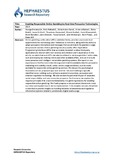| dc.contributor.author | Drosatos, George | |
| dc.contributor.author | Nalbadis, Fotis | |
| dc.contributor.author | Arden-Close, Emily | |
| dc.contributor.author | Baines, Victoria | |
| dc.contributor.author | Bolat, Elvira | |
| dc.contributor.author | Vuillier, Laura | |
| dc.contributor.author | Kostoulas, Theodoros | |
| dc.contributor.author | Budka, Marcin | |
| dc.contributor.author | Wasowska, Sonia | |
| dc.contributor.author | Bonello, Maris | |
| dc.contributor.author | Brown, Jamie | |
| dc.contributor.author | Corner, Tessa | |
| dc.contributor.author | McAlaney, John | |
| dc.contributor.author | Phalp, Keith | |
| dc.contributor.author | Ali, Raian | |
| dc.date.accessioned | 2021-03-06T09:59:09Z | |
| dc.date.available | 2021-03-06T09:59:09Z | |
| dc.date.issued | 2019-01 | |
| dc.identifier.issn | 2255-9922 | |
| dc.identifier.uri | http://hdl.handle.net/11728/11746 | |
| dc.description.abstract | Online gambling, unlike other offline addiction forms, provides unprecedented opportunities for monitoring users’ behaviour in real-time, along with the ability to adapt persuasive interactions and messages that would match the gamblers usage and personal context. Online gambling industry usually offers Application Programming Interfaces (APIs) that are mainly intended to allow third-party applications to interact with their services and enhance user’s experience. In this article, we claim that such API’s can also be utilised to retrieve gamblers’ online data, such as browsing
and betting history and other available offers, and use it to build more proactive and intelligent responsible gambling systems. We report on our experience in this field and make the argument that the available data for persuasive marketing and usability should, under certain usage conditions, also be made available for responsible online gambling services. We discuss the psychological foundations of our proposed approach and the risks and challenges typically identified when building such a software-assisted intervention, persuasion and emotion regulation technology. We also explain the potential impact of corporate social responsibility and data protection prospects. Furthermore, we explore the required principles that should be followed by the gambling industry for enabling responsible online gambling. We finally propose a conceptual architecture to show our vision and explain how it can be implemented. In the broader context, the article is intended to provide insights on building behavioural awareness and regulation information systems related to problematic digital media usage. | en_UK |
| dc.language.iso | en | en_UK |
| dc.publisher | RTU Press | en_UK |
| dc.rights | © 2018 George Drosatos et al. | en_UK |
| dc.rights.uri | http://creativecommons.org/licenses/by-nc-nd/4.0/ | en_UK |
| dc.subject | Persuasive Technologies | en_UK |
| dc.subject | Responsible Online Gambling | en_UK |
| dc.subject | Gambling Data Availability | en_UK |
| dc.subject | Corporate Social Responsibility | en_UK |
| dc.title | Enabling Responsible Online Gambling by Real-time Persuasive Technologies | en_UK |
| dc.type | Article | en_UK |
| dc.doi | https://doi.org/10.7250/csimq.2018-17.03 | en_UK |


